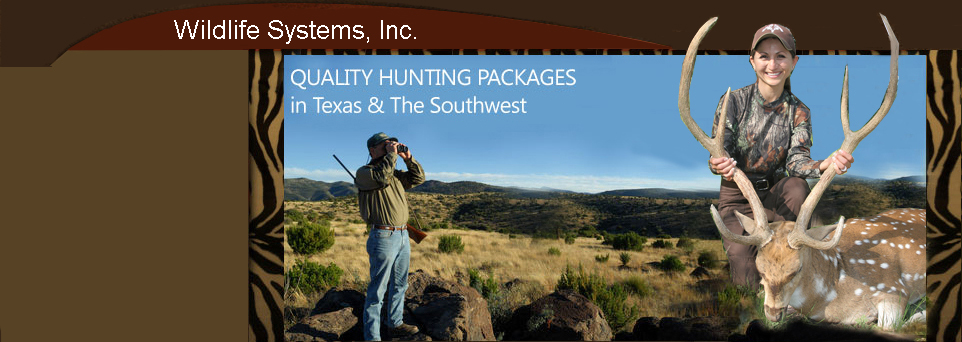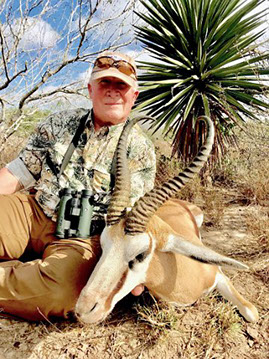(325) 655-0877

TEXAS SPRINGBOK HUNTS
Wildlife Systems, Inc.
Scott Wilson
2019 Springbok - H. Yturria Ranch
Bobby Boyd

Springbok
Springbok, (Antidorcas marsupialis), also called springbuck, graceful, strikingly marked antelope of the gazelle tribe, Antilopini (family Bovidae, order Artiodactyla). The springbok is native to the open, treeless plains of southern Africa. It once roamed in enormous herds but is now much reduced in numbers. It is the symbol and nickname of the national rugby team of South Africa.
Although closely related to true gazelles (genus Gazella), the springbok is placed in a separate genus because of a unique structure on its back that it displays when excited, consisting of a patch of white hair that is normally hidden beneath a skin fold but is erected during a special form of jumping known as pronking. The species name marsupialis refers to this concealed organ, which also happens to be lined with sebaceous scent glands.
Hunt Packages
Wildlife Systems’ impala hunts are generally set up as a 2-3 day package. We charge a daily fee which includes meals, lodging, and guide. In addition to the daily fee, our hunters pay a kill fee which is a set amount and is not dictated by the size but is simply a flat kill fee. For more details on our exotic game fees, click on this link.
Location of Hunt
Most of these hunts take place on the historic H. Yturria Ranches, located near Raymondville and McAllen, Texas. These properties are steeped deep in South Texas History. Francisco Yturria was the patriarch of the Yturria Family who was a successful businessman in both South Texas and Mexico. Along with other prominent business people from the mid-1800 era, such as Richard King and Mifflin Kennedy, Yturria amassed tremendous land-holding in the Rio Grande Valley Region of South Texas. Today, descendants of Francisco Yturria continue to operate 3 divisions of H. Yturria Ranches. Impala hunts are found on the Punta del Monte Division which encompasses approximately 12,000 acres and this property supports roughly 70-90 head of impala.
Meat and Trophy Care
The meat from these animals is excellent eating. So, in addition to a great trophy, you’ll also end of with great table-fare. As part of the package, Wildlife Systems will quarter the meat. We have a walk-in cooler, as well as limited freezer space. On the trophies, our guide will fully cape the head and freeze the cape. You can either take the horns and cape back with you, or we can overnight ship the frozen cape, and you’ll be invoiced for the shipping charges along with a nominal service charge for our time on boxing and shipping. We do not ship meat.
Hunting License
For those hunters who are traveling in from out of state, Wildlife Systems can take care of processing your non-resident license. The cost is $48 and is “over the counter”. You’ll simply need to fill out the Hunter Profile that we will send to you and we’ll take care of the rest.
Gear and Guns
This is a warm part of the world, but it’s best to check the local weather forecast a few days prior to your departure and to pack accordingly. In addition to your regular hunting gear, you might want to bring some sunscreen and bug spray. Impala are think skinned and lightly built animals, so caliber size is not as important on these animals as it is on larger species. As a rule, anything over a 100-grain bullet is sufficient on impala, so something along the lines of a .243, .25-06, or .270 are great choices. Please stay away from high expandable bullets such as Nosler Ballistic Tips, Berger bullets, and hollow points. We recommend a bullet that will expand but hold its mass, such as a partition, A-frame, or bonded bullet.
Travel
The nearest airport is Harlingen, if you are hunting the Yturria Ranch and that property is located about 7 miles north of Raymondville. We can provide CONDITIONAL airport shuttle from Harlingen for an additional fee. Most hunters rent a vehicle and drive to the ranch where the guide meets them at the gate. For hunters who are driving from their home, our Wildlife Systems office staff will provide directions, as well as a contact phone number for the guide.
